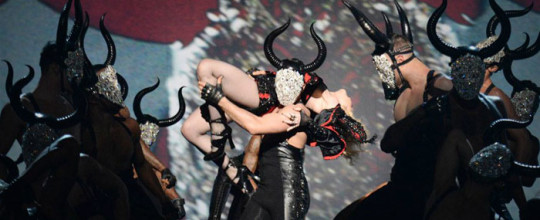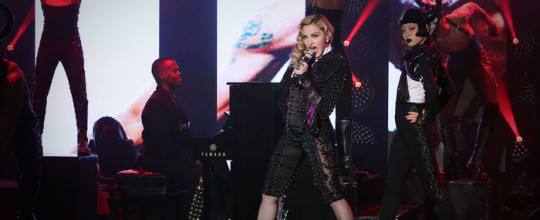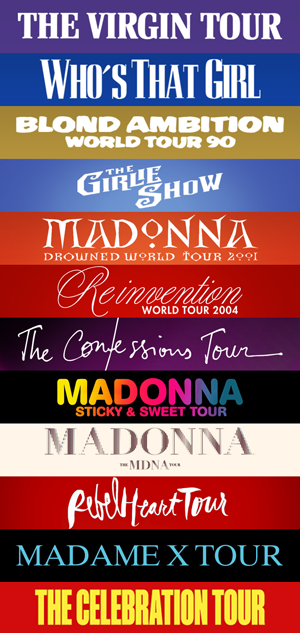Madonna: ‘I’m living in a state of terror’
From The Guardian:
In an exclusive interview, the singer defends her description of the leak of demos from her new album as ‘artistic rape’
Madonna has defended her description of the leak of 13 unfinished demos from her forthcoming album as “a form of terrorism” and “artistic rape”.
Speaking to the Guardian on Sunday, the singer said she was “living in a state of terror” following the leak, adding that there was “a big possibility” that they were the result of her personal computer being hacked.
Obviously there is a person, or a group of people behind this that were essentially terrorising me. I don’t want to sound alarming, but certainly that’s how I felt. It’s one thing if someone comes into your house and steals a painting off your wall – that’s also a violation – but your work, as an artist, that’s devastating. I’m an artistic person, I’m very expressive. I’m sorry if words alarm people, but that’s what it felt like. It was not a consensual agreement. I did not say, ‘Hey, here’s my music, and it’s finished.’ It was theft.
On Saturday, Madonna unexpectedly released six tracks from Rebel Heart on iTunes, following the leak of the unfinished songs earlier in the week; the album itself is not due for release until March. She immediately reached No 1 in the iTunes chart in 36 countries, a situation she described as “a miracle”.
The appearance of the unfinished recordings from Rebel Heart is the latest in a series of high-profile music leaks in the teeth of ever more stringent security measures by record companies. Last year, Kanye West’s keenly anticipated album Yeezus appeared in full online in advance of its release, ironically four hours after the website buzzfeed.com published a feature detailing the painstaking security around the album – which apparently included storing the music on a hard drive in an airtight, watertight case that could withstand the impact of a plane crash or tsunami – under the headline 8 Reasons You Won’t Hear Yeezus Early.
But Madonna suggested that the leak of her demos differed from previous security breaches – frequently traced back to employees of record companies or recording studios – because other, non-musical material appeared online at the same time. “It wasn’t just music,” she said. “Images were coming out that I’d never seen before. It was then I started to think, ‘OK, what’s happening? What is the source of the leak? It’s not just one person, or someone sitting next to me in an office, or someone in a recording studio. I’ve had leaks before, a couple of weeks before an album was released, a lot of other artists have too, we all have to deal with that. But to have songs in the earliest demo form, from last March, that’s extremely disturbing to me.”
The singer said that the leak had forced her to reconsider her working practices, and, in the wake of the Sony Pictures hacking scandal, posed wider questions for the entertainment industry as a whole. “You have to rethink your approach to making music, how to get the information back and forth to people, how to work in a more secure environment. It’s alarming. Alarming because what do we do as artists? We want to finish writing our book or editing our film, we want to finish writing or producing our music. People need the arts, we need to be inspired, we need to hear people’s records and see people’s films. Why destroy that process for creative people? It’s going to affect everybody.”
The six songs from Rebel Heart released thus far do not shy away from controversy: one, Illuminati, mocks the various conspiracy theories abroad on the internet that implicate a variety of entertainers – including Jay-Z and Lady Gaga – in membership of a shadowy ruling elite.
There’s a lot of talk in pop music right now about people saying, ‘Oh, this person’s a member of the Illuminati,’ or ‘They’re Illuminati’, or ‘You’re Illuminati’, and people’s idea that there’s a group of entertainers or very wealthy people, and they work behind the scenes and they control things and they’re very powerful, and there’s possibly a reference to something dark, or black magic, or something like that. And I have to say I laugh at all of those things.
I think there are some people who don’t mind being referred to as that, but I know who the real Illuminati are, and where that word came from. The root of the word is “illuminate”, and that means “the enlightened ones”, and it came from the Age of Enlightenment, when a lot of arts and creativity flourished, from Shakespeare to Isaac Newton, to Leonardo Da Vinci, Michelangelo: the philosophers, artists, scientists were all engaged in a kind of high level of consciousness through their work, and they were enlightening and inspiring people around the world. And those are the true Illuminati. So the purpose for writing that song was really in a way, ‘So, if you think I’m the Illuminati, then thank you very much, it’s a compliment, because I would like very much to be part of that group, the real Illuminati, and this is what it’s not.’
Madonna also claimed that her children acted as her artistic advisers, helping her to make decisions about which producers she worked with: Rebel Heart features contributions from, among others, Kanye West and EDM stars Avicii and Diplo. “I’m certainly not out in nightclubs all the time, but my kids are. My daughter and my son are my A&R people now. They’re constantly playing stuff in the house, in the car, and I’m like, “Who’s that? Who’s that? Who did that?” They bring me stuff all the time. And I listen to music as well, it’s a combination. I manage to surround myself with people who introduce stuff to me, keep me in touch, in tune. I feel like just as connected to street culture, pop culture, underground culture, as I’ve ever been.”
Read the Full Story on The Guardian.







